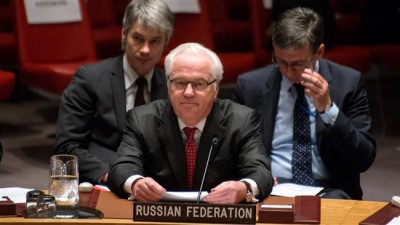NOVANEWS

On Monday, on the eve of his 65th birthday, Russia’s UN envoy died – cause of death so far not announced, perhaps a heart attack, though given US hostility toward Russia, foul play remains a possibility unless forensic analysis rules it out.
Family, friends, colleagues and admirers like myself mourn his tragic loss. Vladimir Putin “express(ed) condolences to (his) family and friends, and to the entire Foreign Ministry following” his death. “The head of state highly valued Churkin’s professionalism and diplomatic talent,” Kremlin spokesman Dmitry Peskov explained.
Deputy Russian Foreign Minister Sergey Ryabkov called him “a rock against which attempts of our enemies to undermine all that makes the glory of Russia break.”
It will be impossible, very difficult to replace him as a symbol of Russia’s foreign policy and Russia’s voice on a key international platform in the Security Council.
Russian Foreign Ministry spokeswoman Maria Zakhavova said he was “admired not only by those who loved him. His opponents also admired him.”
A Foreign Ministry statement said he he “died suddenly in New York on February 20…The outstanding Russian diplomat died in harness.”
In early February, he said diplomatic positions are “much more hectic” than they used to be, very “stressful” because of instability worldwide.
On April 8, 2006, he was appointed Russia’s UN envoy, serving in this capacity honorably and effectively with distinction until his tragic death.
In 1981, he earned a doctorate in history from Soviet Russia’s Diplomatic Academy. After graduating from Moscow State Institute of International Relations in 1974, he joined Soviet Russia’s Foreign Ministry as a translator.
From 1974 – 1979, he was a USSR Strategic Arms Limitation Talks staff member. From 1979 – 1982, he served as Foreign Ministry US desk third secretary.
From 1982 – 1987, he was USSR’s Washington embassy second, then first secretary. From 1987 – 1990, he served as Communist Party of the Soviet Union (CPSU) International Department staff member, then special advisor and press secretary to Foreign Affairs Minister Eduard Shevandnadze.
From 1990 – 1991, he was Foreign Ministry Information Department director. From 1992 – 1994, he served as Russian Federation deputy foreign minister, and special representative of Russia’s president to talks on the former Yugoslavia.
From 1994 – 1998, he was Russia’s ambassador to Belgium, then liaison ambassador to NATO and the Western European Union (WEU).
From 1998 – 2003, he served as ambassador to Canada. From 2003 – 2006, he was ambassador at large, along with other diplomatic responsibilities before his appointment as permanent representative of the Russian Federation to the United Nations.
In February 2012, then President Dmitry Medvedev awarded him the Order of Merit to the Fatherland 4th class – Russia’s highest civilian honor.
Admired by allies and adversaries alike, he’s survived by his two children, Anastasia and Maksim.



